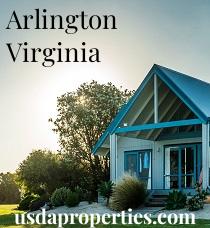Loading Data
*** No USDA eligible properties were found in Arlington ***
To find a home that may be eligible for a USDA loan, have a look at the neighboring city Loudoun Valley Estates, VA. This city falls within a zone of USDA loan eligibility.

Arlington, Virginia in Arlington County
Use the map and table links below to access listing details.
Red areas indicate USDA defined loan exclusion zones.
There are currently no properties eligible for USDA loans in Arlington.
Please try searching another, possibly more rural and populated region. Other cities in Arlington county include:
Addison Heights, Alcova Heights, Allencrest, Arlington Forest, Arlington Heights, Arlington Village, Arlingwood, Arna Valley, Aurora Hills, Ballston, Barcroft, Bellevue Forest, Berkshire, Brandon Village, Broyhill Forest, Buckingham, Cherrydale, Clarendon, Colonial Village, Columbia Forest, Columbia Heights, Country Club Hills, Country Club Manor, Crescent Hills, Crystal Spring Knolls, Dominion Heights, Dominion Hills, Douglass Park, East Falls Church, Fort Barnard Heights, Fort Myer Heights, Glencarlyn, Halls Hill, Highlands, Highview Park, Lacey Forest, Larchmont, Lee Heights, Lyon Park, Lyon Village, Madison Manor, North Fairlington, Overlee Knolls, Parkglen, Radnor Heights, Rivercrest, Riverwood, Rosslyn, Shirlington, South Fairlington, Tara, Virginia Highlands, Walker Chapel, West Arlington, Westmont, Westover, Williamsburg Village, Woodland Acres,
Or have a look at other Virginia counties including:
Accomack, Albemarle, Alexandria, Alleghany, Amelia, Amherst, Appomattox, Augusta, Bath, Bedford, Bland, Botetourt, Bristol, Brunswick, Buchanan, Buckingham, Buena Vista, Campbell, Caroline, Carroll, Charles City, Charlotte, Charlottesville, Chesapeake, Chesterfield, Clarke, Colonial Heights, Covington, Craig, Culpeper, Cumberland, Danville, Dickenson, Dinwiddie, Emporia, Essex, Fairfax, Falls Church, Fauquier, Floyd, Fluvanna, Franklin, Frederick, Fredericksburg, Galax, Giles, Gloucester, Goochland, Grayson, Greene, Greensville, Halifax, Hampton, Hanover, Harrisonburg, Henrico, Henry, Highland, Hopewell, Isle of Wight, James City, King George, King William, King and Queen, Lancaster, Lee, Lexington, Loudoun, Louisa, Lunenburg, Lynchburg, Madison, Manassas, Manassas Park, Martinsville, Mathews, Mecklenburg, Middlesex, Montgomery, Nelson, New Kent, Newport News, Norfolk, Northampton, Northumberland, Norton, Nottoway, Orange, Page, Patrick, Petersburg, Pittsylvania, Poquoson, Portsmouth, Powhatan, Prince Edward, Prince George, Prince William, Pulaski, Radford, Rappahannock, Richmond, Roanoke, Rockbridge, Rockingham, Russell, Salem, Scott, Shenandoah, Smyth, Southampton, Spotsylvania, Stafford, Staunton, Suffolk, Surry, Sussex, Tazewell, Virginia Beach, Warren, Washington, Waynesboro, Westmoreland, Williamsburg, Winchester, Wise, Wythe, York,
Interested in fun facts and the history of Arlington, VA?
Then read on!
A couple of true facts about Arlington, Virginia are:
1. Arlington is home to the Pentagon, the headquarters of the United States Department of Defense.
2. Arlington National Cemetery is also located in Arlington, Virginia. It is a military cemetery where many American war heroes are buried, including President John F. Kennedy.
Here's a brief history of the city:
Arlington's history dates back to the early 18th century when it was a rural area with agriculture-based activities. The area became more developed after the construction of the Alexandria Canal in 1843, which made it a transportation hub. During the Civil War, Arlington was used as a military headquarters, and the Arlington House, now a part of Arlington National Cemetery, was used as a military hospital.
After the war, the government acquired the land and began building the Arlington National Cemetery. As the years went by, Arlington developed into a residential area with many suburban neighborhoods. Today, it is a diverse area with a population of over 230,000 people and is known for its proximity to Washington D.C. and its tourism industry.